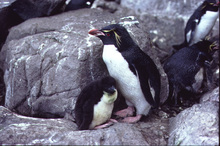Tuesday Jun 12, 2012
The birds, which have distinctive bright red eyes and yellow crests, leave uninhabited Campbell Island, more than 300 nautical miles south of Stewart Island in April and return in early October.
A grant from National Geographic will enable a team of Niwa scientists to head to Campbell Island where they will attach 88 tracking tags to penguins' legs before their departure next year.
The data obtained from the tags will shed light on the penguin's movements and habitat use in New Zealand's sub-Antarctic territory.
"It could be a crucial stage in the breeding cycle for them," said Niwa scientist Dr David Thompson.
"To successfully raise chicks, they need to come back to Campbell Island at the start of the breeding season in good condition.
"This stage of the annual cycle of the birds is likely to be very significant. To know nothing about where this stage takes place is a crucial gap in our understanding of the factors affecting the penguin populations," he said.
Dr Thompson said he suspected the birds didn't go too far north or south.
"They probably stay at the same latitude, but disperse away from the island, spending that time feeding and regaining condition.
"When penguins finish breeding and the chicks leave the island, the parent birds disappear off to sea for a month to feed. When they come back, they are very large and fat. They sit on the breeding site and moult. They don't move or feed for a month."
Between 1942 and 1985, the rockhopper penguin population at Campbell Island declined by about 94 per cent, from about 800,000 breeding pairs to 51,000.
Although the decline has continued, Dr Thompson said the penguins are unlikely to become extinct.
"We think there is just less food. They eat little krill, crustaceans, juvenile and small fish and small squid.
"It's thought that fluctuations in sea temperatures may have led to a reduction in the abundance or availability of their prey."
The penguins breed in colonies on rocky coasts, in the open or among tussock. They usually lay two eggs but the chick from the first egg rarely survives to fledgling stage.
source



















No comments:
Post a Comment